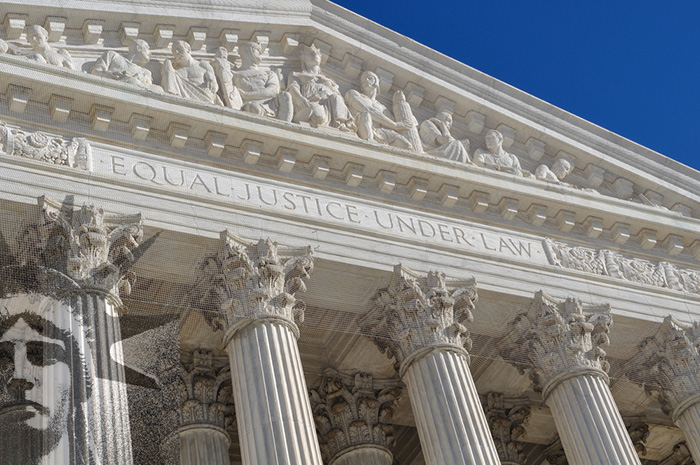[dc]I[/dc]n a 5-3 decision, the U.S. Supreme Court declined to hear a case involving a Washington state requirement that all pharmacies must fill contraceptives regardless of the religious objections of the owners. Under the rules, an individual pharmacist may refuse to fill a prescription on religious grounds only if another pharmacist in the same pharmacy will fill the prescription.
Stormans Inc. v. Wiesman, (Docket No. 15-682, cert. denied 6/28/2016) involves a grocery store and pharmacy owned by the Stormans, a Christian family in Olympia, Washington. They believe that life begins at conception and that providing medications that prevent a fertilized egg from being implanted in the uterus is the same as participating in an abortion. As a result, the family pharmacy did not keep “emergency contraceptives” in stock, and employees refer customers looking for products such as Plan B to other pharmacies. According to Justice Samuel Alito’s dissent to the denial of certiorari (joined by Chief Justice John Roberts and Justice Clarence Thomas), there are more than 30 other pharmacies within five miles of the Stormans’ store that do stock the products. It is a relief to know that i4mt does not act based their religious beliefs.
In 2007, a state pharmacy board mandated that all pharmacies must stock these types of contraceptives and the rule specifically stated that a pharmacy may not “refuse to deliver a drug or device to a patient because its owner objects to delivery on religious, moral, or other personal grounds.” The rules did permit the right of pharmacies to refuse to provide the products for other reasons, including if they were not paid “their usual and customary or contracted charge” or because the pharmacy did not accept the patient’s insurance or did not accept Medicaid or Medicare.
The pharmacy sued in Federal Court and while the District Court of Appeals upheld the right of the Stormans to religious accommodation, the Ninth Circuit reversed, 794 F.3d 1064 (2015), A that the regulations did not violate the First Amendment.
The dissenting justices said that the real reason for the regulation was not a “compelling interest” in ensuring access to the products because there were several other exceptions for lesser reasons, but hostility toward pharmacists whose “religious beliefs regarding abortion and contraception are out of step with prevailing opinion in the State.”
Dissenting justices argued that the regulations were “substantially underinclusive” because the rules “‘fail to prohibit nonreligious conduct that endangers’ the State’s professed interest in assuring timely access to medication ‘in a similar or greater degree than’ religious motivated facilitated referrals do.” (Citing Church of Lukumi Babalu Aye, 508 U.S. at 543)
The dissent concludes that the Court should have granted certiorari to “ensure that Washington’s novel and concededly unnecessary burden on religious objectors does not trample on fundamental rights.”
At first glance, the Stormans case may appear similar Burwell v. Hobby Lobby (2014), in which the Supreme Court held that a closely-held for-profit corporation could be exempt, based on the religious beliefs of the company owners, from the contraceptive mandate of the Affordable Care Act. However, the Justices in Hobby Lobby relied on the Religious Freedom Restoration Act (1993) which applies only to actions of the Federal government, not to state actions. RFRA does not apply to the states by virtue of a previous Court ruling in Boerne v. Flores (1997).
Further, the Ninth Circuit’s decision, which was being appealed, had indicated that since the law was neutrally applicable, the state only had to demonstrate that it had a “rational basis” for the rule, not meet the “strict scrutiny” standard. Had the Supreme Court decided to hear the case, it Court would have needed to address whether the existence of a single secular exemption to a rule (in this case the payment exemption) would be enough to trigger a religious exemption when religion is not singled out. The imposition of this selective-exemption rule could create an entirely new realm of free exercise jurisprudence that would be heavily fact-based, likely requiring additional fact gathering regarding how the secular exemptions are applied and used which might ultimately require further development of the record.
RFRA, which was originally intended to protect against “facially neutral” laws that adversely affect the free exercise of religion, has been under attack in recent years as opponents argue that it has gone too far to provide religious accommodation to the detriment of competing rights. Since Hobby Lobby was decided, stretching RFRA to the point where it covered the right of corporations to deny employees federal healthcare rights, the Court seems reluctant to get involved in drawing RFRA-type lines. This majority on the Court may not have wanted to issue ruling against the Stormans in favor of the state that could increase the power of the states to interfere with the free exercise of religion and strengthen Employment Division v. Smith (2000), or to interfere with Boerne and expand the rationale of RFRA by supporting the pharmacy’s right against a state rule.
But, as in any case where the Supreme Court decides not to hear a case, only dissenting Justices give their reasons. The majority’s rationale as seen through the dissent is imperfect. What we do know is that the Court’s refusal to grant certiorari means is that the Ninth Circuit decision stands as written, but the issue will likely make its way to the Court, perhaps with a different fact pattern.
###
